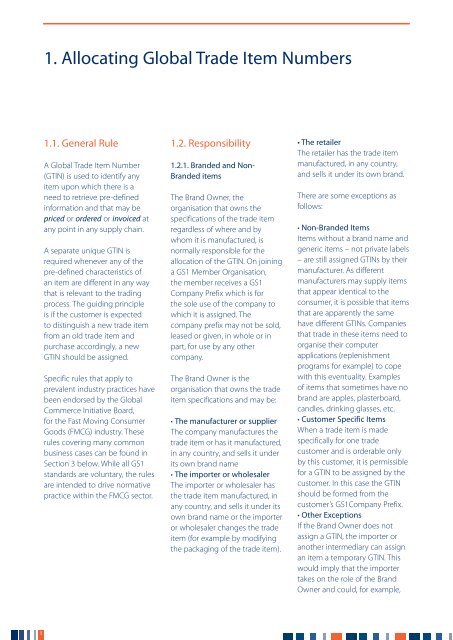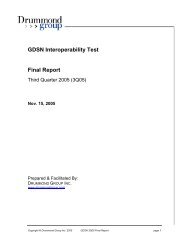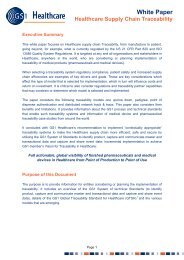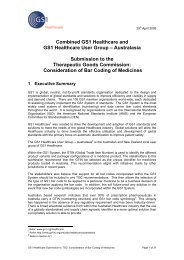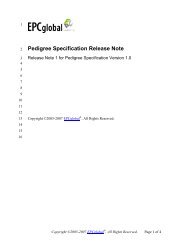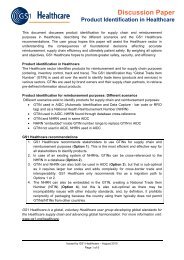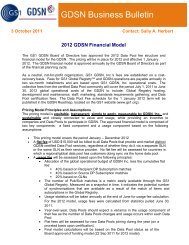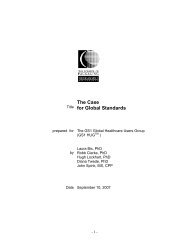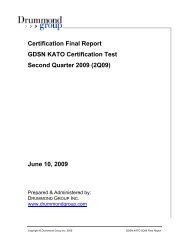GS1 GTIN Allocation Rules
GS1 GTIN Allocation Rules
GS1 GTIN Allocation Rules
Create successful ePaper yourself
Turn your PDF publications into a flip-book with our unique Google optimized e-Paper software.
5<br />
1. Allocating Global Trade Item Numbers<br />
1.1. General Rule<br />
A Global Trade Item Number<br />
(<strong>GTIN</strong>) is used to identify any<br />
item upon which there is a<br />
need to retrieve pre-defined<br />
information and that may be<br />
priced or ordered or invoiced at<br />
any point in any supply chain.<br />
A separate unique <strong>GTIN</strong> is<br />
required whenever any of the<br />
pre-defined characteristics of<br />
an item are different in any way<br />
that is relevant to the trading<br />
process. The guiding principle<br />
is if the customer is expected<br />
to distinguish a new trade item<br />
from an old trade item and<br />
purchase accordingly, a new<br />
<strong>GTIN</strong> should be assigned.<br />
Specific rules that apply to<br />
prevalent industry practices have<br />
been endorsed by the Global<br />
Commerce Initiative Board,<br />
for the Fast Moving Consumer<br />
Goods (FMCG) industry. These<br />
rules covering many common<br />
business cases can be found in<br />
Section 3 below. While all <strong>GS1</strong><br />
standards are voluntary, the rules<br />
are intended to drive normative<br />
practice within the FMCG sector.<br />
1.2. Responsibility<br />
1.2.1. Branded and Non-<br />
Branded items<br />
The Brand Owner, the<br />
organisation that owns the<br />
specifications of the trade item<br />
regardless of where and by<br />
whom it is manufactured, is<br />
normally responsible for the<br />
allocation of the <strong>GTIN</strong>. On joining<br />
a <strong>GS1</strong> Member Organisation,<br />
the member receives a <strong>GS1</strong><br />
Company Prefix which is for<br />
the sole use of the company to<br />
which it is assigned. The<br />
company prefix may not be sold,<br />
leased or given, in whole or in<br />
part, for use by any other<br />
company.<br />
The Brand Owner is the<br />
organisation that owns the trade<br />
item specifications and may be:<br />
• The manufacturer or supplier<br />
The company manufactures the<br />
trade item or has it manufactured,<br />
in any country, and sells it under<br />
its own brand name<br />
• The importer or wholesaler<br />
The importer or wholesaler has<br />
the trade item manufactured, in<br />
any country, and sells it under its<br />
own brand name or the importer<br />
or wholesaler changes the trade<br />
item (for example by modifying<br />
the packaging of the trade item).<br />
• The retailer<br />
The retailer has the trade item<br />
manufactured, in any country,<br />
and sells it under its own brand.<br />
There are some exceptions as<br />
follows:<br />
• Non-Branded Items<br />
Items without a brand name and<br />
generic items – not private labels<br />
– are still assigned <strong>GTIN</strong>s by their<br />
manufacturer. As different<br />
manufacturers may supply items<br />
that appear identical to the<br />
consumer, it is possible that items<br />
that are apparently the same<br />
have different <strong>GTIN</strong>s. Companies<br />
that trade in these items need to<br />
organise their computer<br />
applications (replenishment<br />
programs for example) to cope<br />
with this eventuality. Examples<br />
of items that sometimes have no<br />
brand are apples, plasterboard,<br />
candles, drinking glasses, etc.<br />
• Customer Specific Items<br />
When a trade item is made<br />
specifically for one trade<br />
customer and is orderable only<br />
by this customer, it is permissible<br />
for a <strong>GTIN</strong> to be assigned by the<br />
customer. In this case the <strong>GTIN</strong><br />
should be formed from the<br />
customer’s <strong>GS1</strong>Company Prefix.<br />
• Other Exceptions<br />
If the Brand Owner does not<br />
assign a <strong>GTIN</strong>, the importer or<br />
another intermediary can assign<br />
an item a temporary <strong>GTIN</strong>. This<br />
would imply that the importer<br />
takes on the role of the Brand<br />
Owner and could, for example,


